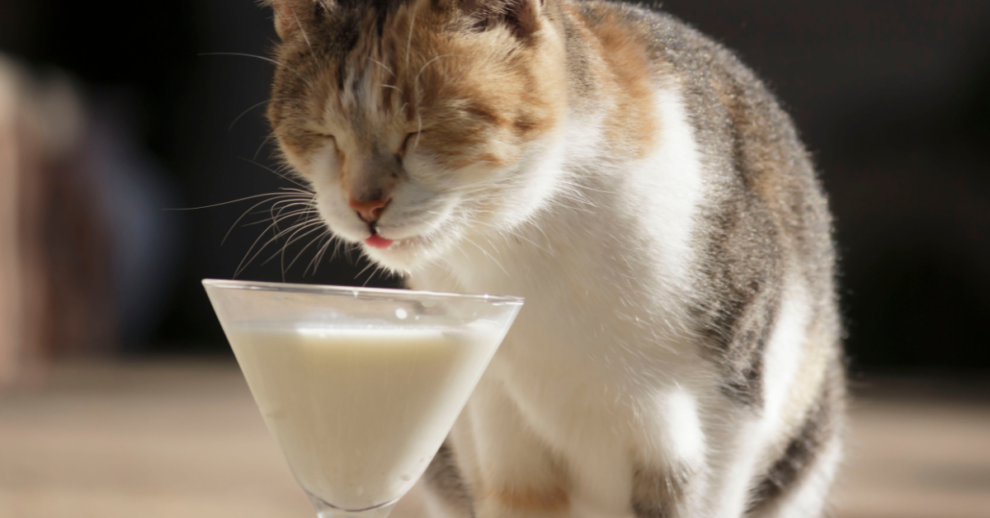Many people have the classic image of a cat enjoying a bowl of milk. But is that image actually true? Although we often think cats love milk, this drink is not good for most cats at all. In this blog, we dive deeper into the question: can cats have milk? We discuss the facts, possible health problems, and give you safe alternatives for your beloved cat.
Milk and cats: where did the myth come from?
The idea that cats like milk is deeply rooted in culture. This image came about because milk used to be commonly found on farms. Cats came in contact with milk here and could sometimes enjoy a sip, especially since it was fattier and more unprocessed at the time. This association stuck, and soon the image of the "cat and milk" became a cliché.
Why do cats like milk?
Cats may be attracted to the smell and taste of milk, especially because of its fat content. This makes milk tempting to them, but their bodies are often unable to digest it properly. Kittens naturally drink milk from their mothers, but that mother's milk contains much less lactose than cow's milk and is specially tailored to their needs.
Can cats digest milk?
Here comes the problem: Most adult cats cannot properly digest lactose, a sugar in milk. Kittens do have an enzyme called lactase, which helps break down lactose so it can be digested. However, once they get older and start eating solid foods, most cats lose most of this enzyme. As a result, many adult cats cannot digest lactose properly, which can lead to digestive problems.

Dangers of milk to cats
If a cat drinks milk without the enzyme lactase to break down lactose, it can cause a number of unpleasant symptoms:
- Stomach Pain: Many cats get stomach problems when they drink milk.
- Diarrhea: Lactose-intolerant cats may develop diarrhea, which can cause dehydration, especially if they drink milk more frequently.
- Gas formation: The lack of enzymes often results in gas, which can cause discomfort and bloating.
Although these symptoms are usually not life-threatening, they can be quite annoying for your cat and cause unnecessary stress and discomfort.
What if your cat does like milk?
Some cats really like the taste and texture of milk. If it doesn't bother your cat, a very small amount of milk once in a while won't hurt. But pay close attention to their reaction: if you notice that they get stomach or intestinal discomfort, it's better to stop.
In addition, fortunately, there are a few safe alternatives that can give your cat the pleasure of milk without the drawbacks.
Safe alternatives to milk
- Lactose-free cat milk: You can buy special cat milk in most pet stores. This is lactose-free and specially formulated for cats, so they can enjoy it without getting digestive problems.
- Small amounts of lactose-free milk: Some cats also tolerate plain lactose-free milk well. Start with a small amount and see how your cat reacts to it.
- Flavored water: Try mixing water with a small amount of fish juice from tuna in water, for example. This flavors the water and can be attractive to your cat without being harmful.

What is the best drink for cats?
The only necessary and healthy drink for cats is really just water. Cats, like us, need fresh, clean water daily to stay hydrated. Always have plenty of fresh water in the house and change it daily. Cats also tend to find running water more attractive, so a drinking fountain can be a good investment if you find that your cat doesn't drink much. If you do want to give something special, such as during the holidays, make a pet-friendly mocktail!
Are kittens allowed milk?
Yes, a kitten can have milk, but it must be the right kind of milk. Kittens drink mother's milk for the first few weeks of life, which is specially tailored to their nutritional needs. If the mother cat is unable to feed her kittens, or if you have an orphaned kitten, you need to give special kitten milk. You can buy this from the pet store or veterinarian. Kitten milk is specially formulated for the digestive and nutritional needs of kittens. It contains all the essential nutrients they need to grow.
Cow's milk is not suitable for kittens because it contains far too much lactose and does not contain the proper nutrients for their growth. Kittens may develop stomach upset, diarrhea, and dehydration as a result. So avoid regular cow's milk and always choose a product designed specifically for kittens.

Conclusion: can cats have milk?
In short, adult cats are better off not drinking regular milk. Due to lactose intolerance, many cats can develop digestive problems from it. If you do want to give your cat an occasional treat, choose lactose-free cat milk or another healthy and safe option. But the very best thing you can do for your cat is provide fresh water and healthy food that meets their needs.
Want to spoil your cat? That's fine with other healthy snacks that are specially tailored to their digestive needs. In the end, a happy and healthy cat is the most important thing, with or without milk!





